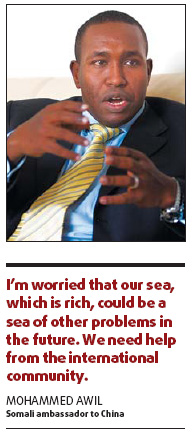Foreign and Military Affairs
Help us build a coast guard, pleads Somali diplomat
By Li Xiaokun (China Daily)
Updated: 2009-12-29 07:54
 |
Large Medium Small |
China has done an excellent job protecting and rescuing ships in the Gulf of Aden for the last 12 months, but the threat from pirates off the coast of east Africa has in no way diminished, said Mohammed Awil, the Somali ambassador to China.

Awil said international help to build a Somali navy was the only way to truly rid the country's waters of vicious hijackers.
"Some foreign ships are there for their own nation's purposes but our Chinese friends are not. They have done a good job," he told China Daily on the eve of the first anniversary of the Chinese navy's departure on Dec 26. "We appreciate it. China is helping and supporting. For all the merchant vessels, whatever flag they fly, as soon as they get an urgent call or they see (an attack), they act immediately."
He said he and his wife would like to visit those troops charged with protecting the Gulf of Aden during Spring Festival to thank them personally.
However, 12 months after the start of the joint anti-piracy mission, he said the number of pirates remains the same, while vessels are still being attacked and seized.
"The pirates are very intelligent. They know how to operate," said the ambassador, who added that his biggest fear was an environmental disaster caused by an assault on an oil tank.
The best and most effective way to eradicate piracy is to build up a Somali coast guard, said Awil before explaining that such a force would only need small boats, communication equipment and training.
The diplomat said he is not sure how much the project would cost, but he said the boats "would not cost much" and could set off the high insurance fees brought by the rampant piracy.
"There are many countries in the Somali area, if each country contributes one or two ships it would be very helpful," he said.
Despite continued calls for help, Awil said many countries are neglecting his nation in order to instead protect their own interests. "Some countries are violating our waters and taking our resources, that's why they don't want to set up a Somali navy."
"They hide during the day the fishing boats have small nets so even the small fish are caught. They also destroying our coral reefs," he complained.
Even worse is that people living in coastal areas are dying of unknown diseases due to exposure to the disposed nuclear waste, said Awil.
Allegations of dumping of toxic waste and illegal fishing have circulated since the early 1990s, reported Al Jazeera, the Arabic news network based in Doha, Qatar.
Piracy is "killing and damaging Somalia's reputation", while the foreign ships acting illegally are killing the country, said Awil. "How will my nation survive? We don't have the means to clean up (the nuclear waste).
"I'm worried that our sea, which is rich, could be a sea of other problems in the future. We need help from the international community," he said.











